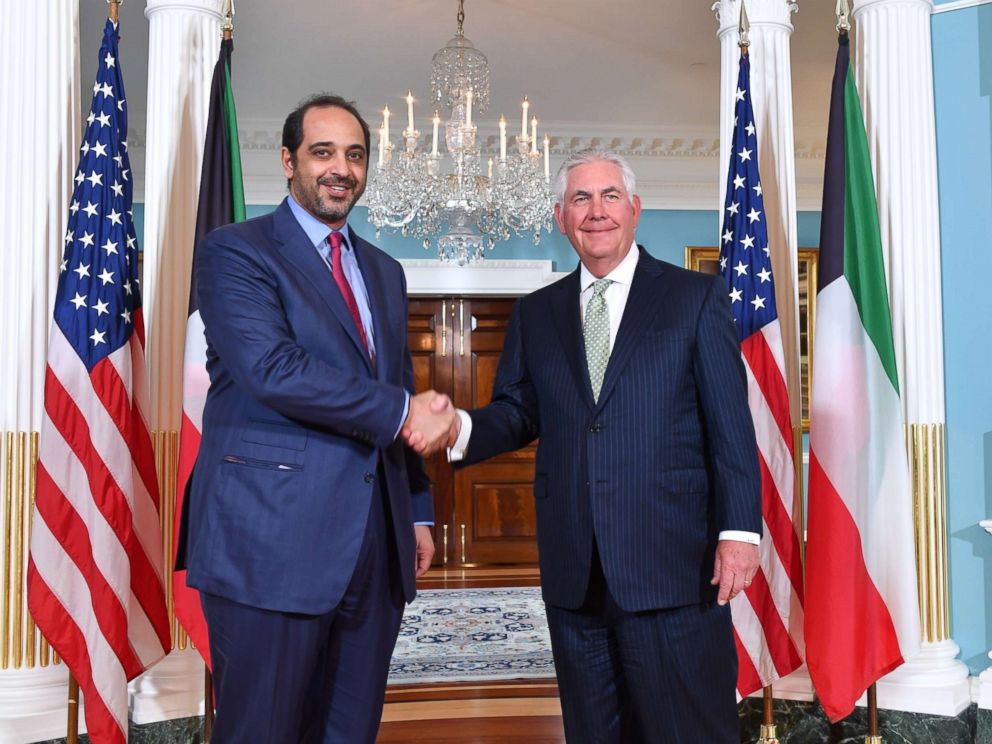Tillerson urges negotiation to end Gulf crisis, but Saudis say no
The top U.S. diplomat held another round of meetings to end the impasse.
— -- Secretary of State Rex Tillerson held another round of meetings today in an effort to end the crisis among its Gulf allies but was met with a continued impasse.
As the top U.S. diplomat urges restraint and negotiation, Saudi Arabia and the United Arab Emirates say their demands on neighbor Qatar are nonnegotiable.
And Qatar meanwhile says it is not even reviewing the demands from Saudi Arabia, the UAE and other Arab countries that moved earlier this month to isolate it for its alleged support of terrorism.
Tillerson on Tuesday met with the Qatari foreign minister, declining to answer reporters’ shouted questions about stalled talks beforehand. Later in the evening, he met with the Kuwaiti minister of state for cabinet affairs.
Kuwait, with the support of the U.S., is trying to mediate the dispute between Qatar on one side and Saudi Arabia, the United Arab Emirates, Bahrain, and Egypt on the other.
Before the meeting with the Kuwaiti official, Tillerson told reporters, “We hope all the parties will continue to talk to one another in good faith.”

Afterward, Tillerson’s spokesperson Heather Nauert released a statement saying the secretary and Sheikh Mohammad Abdullah Al-Sabah of Kuwait “reaffirmed the need for all parties to exercise restraint to allow for productive diplomatic discussions. The secretary urged the parties to remain open to negotiation as the best way to resolve the dispute.”
But just hours earlier, Saudi foreign minister Adel al Jubeir told reporters that none of the 10 items on his group's list of demands are negotiable and that Qatar must meet them all.
They include: shutting down Qatar’s multinational news network, Al Jazeera; cutting back ties with Iran; ending support for the Muslim Brotherhood, Hamas, and other Islamist groups; and closing a Turkish military base.
“We stay where we are. We’ve made our point, we’ve taken our positions. If Qatar wants to come back into the [Gulf Cooperation Council] pool, they know what they have to do,” Jubeir said.
“If they don’t, they will remain isolated. We don’t have to deal with them… We don’t have to deal with a country that has done harm to us, unless they change their behavior,” he added.
To Saudi officials, Qatar's fulfilling their demands could mean meeting the spirit of some of them, without accomplishing each item itself. But either way, that hard line and willingness to leave Qatar – a key U.S. ally that hosts nearly 10,000 troops supporting the fight against ISIS – out in the cold is at odds with the U.S. view.
On the other side, the Qatari foreign minister told the Al Hurra news outlet that it will not respond until the Saudis and others provide evidence for their accusations. He told Al Jazeera “the demands must be realistic and enforceable and otherwise are unacceptable.”
All of this leaves the U.S. in a difficult spot -- torn between crucial allies who are no closer to an agreement despite weeks of public pressure, and some mixed messages, from the administration.
Going forward, the U.S. won’t weigh in on which demands Qatar should meet and which are unrealistic, but wants the two sides to figure that out, Nauert said at the briefing Tuesday.
“I don’t know that that’s for the State Department to weigh in at that level, because ultimately, these parties have to live with the decisions and the agreements that they make,” she said.
Al Jubeir denied that the timing of the crisis was tied to Trump, after speculation that the Saudis and their allies felt emboldened to take action after the president’s warm visit to the Kingdom. And he wouldn’t say if there were talks to move the enormous U.S. air base in Qatar to the UAE or Saudi Arabia, saying that was an American decision.




